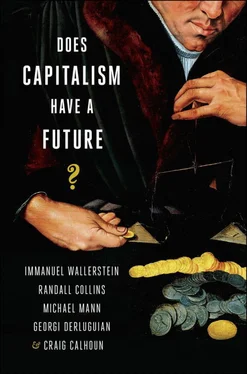Immanuel Wallerstein - Does Capitalism Have a Future?
Здесь есть возможность читать онлайн «Immanuel Wallerstein - Does Capitalism Have a Future?» весь текст электронной книги совершенно бесплатно (целиком полную версию без сокращений). В некоторых случаях можно слушать аудио, скачать через торрент в формате fb2 и присутствует краткое содержание. Город: New York, Год выпуска: 2013, ISBN: 2013, Издательство: Oxford University Press, Жанр: Публицистика, sci_economy, на английском языке. Описание произведения, (предисловие) а так же отзывы посетителей доступны на портале библиотеки ЛибКат.
- Название:Does Capitalism Have a Future?
- Автор:
- Издательство:Oxford University Press
- Жанр:
- Год:2013
- Город:New York
- ISBN:978-0-19-933084-3
- Рейтинг книги:5 / 5. Голосов: 1
-
Избранное:Добавить в избранное
- Отзывы:
-
Ваша оценка:
- 100
- 1
- 2
- 3
- 4
- 5
Does Capitalism Have a Future?: краткое содержание, описание и аннотация
Предлагаем к чтению аннотацию, описание, краткое содержание или предисловие (зависит от того, что написал сам автор книги «Does Capitalism Have a Future?»). Если вы не нашли необходимую информацию о книге — напишите в комментариях, мы постараемся отыскать её.
Does Capitalism Have a Future? — читать онлайн бесплатно полную книгу (весь текст) целиком
Ниже представлен текст книги, разбитый по страницам. Система сохранения места последней прочитанной страницы, позволяет с удобством читать онлайн бесплатно книгу «Does Capitalism Have a Future?», без необходимости каждый раз заново искать на чём Вы остановились. Поставьте закладку, и сможете в любой момент перейти на страницу, на которой закончили чтение.
Интервал:
Закладка:
Historical social science from the outset has dealt with conflict, transitions, and mutations. Hence the main question of this book: What if the future is fraught with major crises? Social landscapes are fluid and often turbulent, perhaps more like weather maps. Local events are inherently contingent even if in retrospect we can explain them by pinpointing which structures had shifted or broken down, and what human action, emerging from specific positions, ended up taking the emergent opportunities. Predicting events in the longer run is futile, but predicting structural configurations is not. Take the weather analogy. It would be irresponsible to predict that next year, say, on the 13th of January it will snow in Chicago. This is the “short” time of contingent events. But it would seem trivial to predict that it will snow in Chicago next January. This statement belongs to the longer-run time of structures. However, what about several decades into the future when Chicago climate might come to resemble hurricane-prone Florida or, alternatively, frozen Siberian tundra?
Readers seeking exact future scenarios in this book may feel frustrated. Their frustration is unwarranted. Lack of precision in social forecasting means that collectively we face a certain freedom of action on a spate of structurally available options. The options are rather limited in normal times although even then there exists political choice between somewhat better and somewhat worse outcomes. But the options become vastly magnified in periods of crisis when the usual mechanisms of status quo are breaking down. Such times call for a conscious strategy of systemic transformation. Humans do make their futures, in conflict and association with other humans, even if not in the circumstances of their own choosing. Social science should clarify what are the circumstances and emerging possibilities, especially when the possibilities may be opening and closing rapidly.
On this score we are critical of contemporary social science for its willful abstraction from structural possibilities of historical change. Our charges equally apply to two very different mainstream currents—postmodernism and neoclassical economics—that have come to dominate academic social sciences since the 1980s. Both, in their own ways, reflect the nameless period following the crisis decade of the 1970s, the decline of leftist movements, and the relaunching of American hegemonic ambitions in the project of neoconservative globalization.
Various intellectual currents, stronger in the humanities and summarily grouped under the rubric of postmodernism, became extremely skeptical of any big theories or what they called “master-narratives.” Instead they celebrated doubt, irony, lived experience, deconstruction of beliefs, and the minute interpretations of cultural practices. This intellectual movement grew directly from the revolts of 1968 and the demographic shifts in the composition of academia with the advent of women and minorities. The shift of attention to the ways in which humans imagine themselves and envision their social universes helped to instill a new critical awareness of the matters of faith that had hitherto remained unspoken and unexamined. The postmodernist movement stirred many stagnant waters, but it left them muddied.
On the opposite side, the field of social science fell under the domination of neoclassical economics and its formalistic emulators in other disciplines. The structures underpinning this situation are not too different from the erstwhile influence of astrology. A healthy dose of Swiftean parody may be in order here. Astrology before modern times, like economics today, was established expertise. It enjoyed the ears of the rulers in virtually all civilizations, East and West. It brought generous remuneration because the highest remuneration is commanded by the experts in the areas of highest human uncertainty and anxiety. In the imperial and feudal political structures based on the familial control of rent, the greatest elite anxieties were associated with dynastic succession and rapidly turning luck in warfare. In much the same way, capitalist anxieties derive from uncertain investment choices, market volatility, and the popular opposition that their operations occasionally generate. Astrology, like neoclassical economics, both functioned as ideological disciplines conforming to the common sense of the contemporary dominant classes. Astrology at its heyday, however, was more than merely a reflection of elite ideology. At its best, astrology was a highly mathematized discipline based on centuries-long accumulation of empirical observations which became the foundation of modern astronomy. Since things turned out as predicted only about half of the time, practical forecasting was subtly corrected by intuition and political acumen. A successful astrologer had to master the demeanor of an astute courtier. Much the same applies to practicing business advisers and government economists in our day.
In times of crisis and resulting political polarization economists and political scientists will find plenty of opportunities to do something new. There will be whole new fronts of pathbreaking research, for instance, in the alternative organization of markets. The dismissal of market possibilities was a major theoretical and practical mistake of twentieth-century leftist movements. We treat with great respect the intellectual legacy of Joseph Schumpeter. But what will be the future uses of his theory of entrepreneurial dynamism? Who or what could play the role of entrepreneurs in the future, even beyond the crisis of capitalism? Is it possible to harness entrepreneurial energies toward more market creativity and less destruction?
No less seriously we take Karl Polanyi’s idea of ‘fictitious commodities’, like land, money, and human life, that cannot be traded. In the twenty-first century “land” broadly means the environment, “money” is global finance, and “human life” stands for the internationalization of the costs of social reproduction through the public support of decent and affordable healthcare, education, housing, pensions, and not least, physical security of our cities. Can a postcapitalist world economy be structured into sectors operating on different principles: the priority of social reproduction in the sector of broadly construed public utilities and the priority of market effectiveness in the sector of consumer goods and services? Moreover, the postcapitalist economic systems may themselves not be static. Periodic reversion to market economies with private property, in some degree or another, may well occur in the future. The world may see yet more swings between capitalist and noncapitalist arrangements of the economy. This too will have to be managed.
No less politically harmful than the aversion to markets is the aversion to the directing power of states. Far from coincidentally, the neoconservative restoration during the last decades of the twentieth century in the wake of collapses on the political left, relentlessly challenged state powers through deregulation and globalization. Capitalists grew suspicious of “Big Government” for the quite real reason that modern states potentially could be captured by the non-elite citizens—in democratic elections, street insurrections, or both—and used for the noncapitalist purposes of market regulation and social redistribution. Big welfare state had to be tolerated, to a degree, immediately after 1945 for the sake of resumed peace. But by the 1970s many capitalists, especially in America, had become emboldened by the opportunity to defeat the left and roll back postwar compromises. Now a major question for theorizing is whether the modern bureaucratic state can play a good role, bad role, or no role at all in steering our collective affairs through times of crisis and the looming systemic transformation. This big question falls into many subordinate questions, practical issues, and theoretical paradoxes that remain to be explored. Social scientists will have plenty of intellectual work of crucial importance in rising to these challenges.
Читать дальшеИнтервал:
Закладка:
Похожие книги на «Does Capitalism Have a Future?»
Представляем Вашему вниманию похожие книги на «Does Capitalism Have a Future?» списком для выбора. Мы отобрали схожую по названию и смыслу литературу в надежде предоставить читателям больше вариантов отыскать новые, интересные, ещё непрочитанные произведения.
Обсуждение, отзывы о книге «Does Capitalism Have a Future?» и просто собственные мнения читателей. Оставьте ваши комментарии, напишите, что Вы думаете о произведении, его смысле или главных героях. Укажите что конкретно понравилось, а что нет, и почему Вы так считаете.












